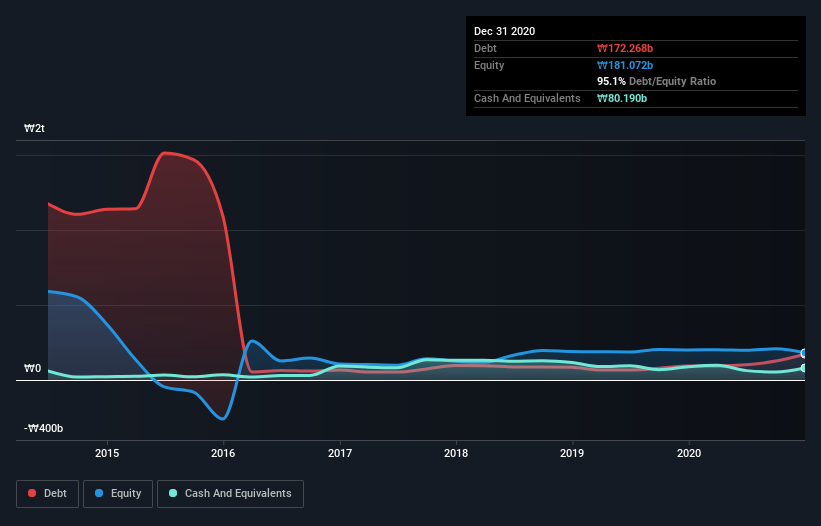- South Korea
- /
- Construction
- /
- KOSE:A001470
Is Sambu Engineering & Construction (KRX:001470) A Risky Investment?

David Iben put it well when he said, 'Volatility is not a risk we care about. What we care about is avoiding the permanent loss of capital.' So it seems the smart money knows that debt - which is usually involved in bankruptcies - is a very important factor, when you assess how risky a company is. We can see that Sambu Engineering & Construction Co., Ltd (KRX:001470) does use debt in its business. But is this debt a concern to shareholders?
When Is Debt A Problem?
Generally speaking, debt only becomes a real problem when a company can't easily pay it off, either by raising capital or with its own cash flow. In the worst case scenario, a company can go bankrupt if it cannot pay its creditors. However, a more usual (but still expensive) situation is where a company must dilute shareholders at a cheap share price simply to get debt under control. Of course, the upside of debt is that it often represents cheap capital, especially when it replaces dilution in a company with the ability to reinvest at high rates of return. When we think about a company's use of debt, we first look at cash and debt together.
View our latest analysis for Sambu Engineering & Construction
How Much Debt Does Sambu Engineering & Construction Carry?
The image below, which you can click on for greater detail, shows that at December 2020 Sambu Engineering & Construction had debt of ₩172.3b, up from ₩93.2b in one year. However, it does have ₩80.2b in cash offsetting this, leading to net debt of about ₩92.1b.

How Healthy Is Sambu Engineering & Construction's Balance Sheet?
The latest balance sheet data shows that Sambu Engineering & Construction had liabilities of ₩230.4b due within a year, and liabilities of ₩77.3b falling due after that. Offsetting this, it had ₩80.2b in cash and ₩125.0b in receivables that were due within 12 months. So it has liabilities totalling ₩102.5b more than its cash and near-term receivables, combined.
This deficit isn't so bad because Sambu Engineering & Construction is worth ₩364.5b, and thus could probably raise enough capital to shore up its balance sheet, if the need arose. However, it is still worthwhile taking a close look at its ability to pay off debt. The balance sheet is clearly the area to focus on when you are analysing debt. But you can't view debt in total isolation; since Sambu Engineering & Construction will need earnings to service that debt. So when considering debt, it's definitely worth looking at the earnings trend. Click here for an interactive snapshot.
In the last year Sambu Engineering & Construction wasn't profitable at an EBIT level, but managed to grow its revenue by 67%, to ₩379b. Shareholders probably have their fingers crossed that it can grow its way to profits.
Caveat Emptor
While we can certainly appreciate Sambu Engineering & Construction's revenue growth, its earnings before interest and tax (EBIT) loss is not ideal. Indeed, it lost ₩3.3b at the EBIT level. When we look at that and recall the liabilities on its balance sheet, relative to cash, it seems unwise to us for the company to have any debt. Quite frankly we think the balance sheet is far from match-fit, although it could be improved with time. Another cause for caution is that is bled ₩30b in negative free cash flow over the last twelve months. So in short it's a really risky stock. The balance sheet is clearly the area to focus on when you are analysing debt. However, not all investment risk resides within the balance sheet - far from it. These risks can be hard to spot. Every company has them, and we've spotted 3 warning signs for Sambu Engineering & Construction (of which 1 doesn't sit too well with us!) you should know about.
At the end of the day, it's often better to focus on companies that are free from net debt. You can access our special list of such companies (all with a track record of profit growth). It's free.
If you're looking for stocks to buy, use the lowest-cost* platform that is rated #1 Overall by Barron’s, Interactive Brokers. Trade stocks, options, futures, forex, bonds and funds on 135 markets, all from a single integrated account. Promoted
New: Manage All Your Stock Portfolios in One Place
We've created the ultimate portfolio companion for stock investors, and it's free.
• Connect an unlimited number of Portfolios and see your total in one currency
• Be alerted to new Warning Signs or Risks via email or mobile
• Track the Fair Value of your stocks
This article by Simply Wall St is general in nature. It does not constitute a recommendation to buy or sell any stock, and does not take account of your objectives, or your financial situation. We aim to bring you long-term focused analysis driven by fundamental data. Note that our analysis may not factor in the latest price-sensitive company announcements or qualitative material. Simply Wall St has no position in any stocks mentioned.
*Interactive Brokers Rated Lowest Cost Broker by StockBrokers.com Annual Online Review 2020
Have feedback on this article? Concerned about the content? Get in touch with us directly. Alternatively, email editorial-team (at) simplywallst.com.
About KOSE:A001470
Sambu Engineering & Construction
Engages in the construction business in South Korea and internationally.
Good value slight.
Market Insights
Community Narratives





